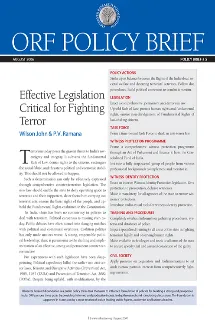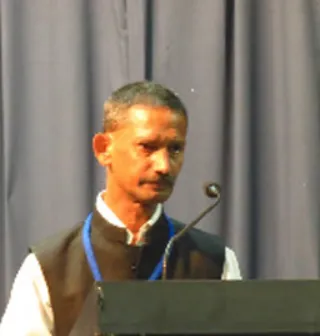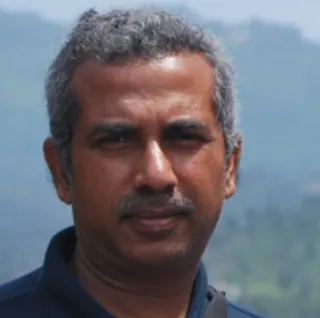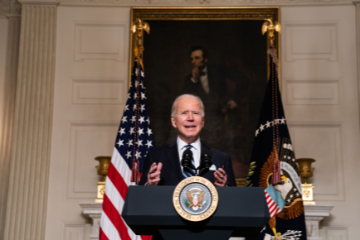Terrorism today poses the gravest threat to India’s sovereignty and integrity. It subverts the fundamental Rule of Law, denies rights to the citizens, endangers the social fabric, and threatens political and economic stability. This should not be allowed to happen.
Such a determination can only be effectively expressed through comprehensive counter-terrorism legislation. The new law should enable the state to deny operating space to terrorists and their supporters, deter them from carrying out terrorist acts, ensure the basic rights of the people, and uphold the Fundamental Rights enshrined in the Constitution.
In India, there has been no consistency in policies to deal with terrorism. Political consensus is missing even today. Public debates have often turned into slanging matches with political and communal overtones. Coalition politics has only made matters worse. A strong, responsible political leadership, thus, is paramount to the drafting and implementation of an effective, strong and permanent counter-terrorism law.
Past experiences with such legislation have been disappointing. Political expediency killed the earlier two anti-terror laws, Terrorist and Disruptive Activities (Prevention) Act, 1985, 1987 (TADA) and Prevention of Terrorism Act, 2002 (POTA). Despite being upheld, with modifi cations, by the Supreme Court of India, while TADA was allowed to lapse, POTA was repealed. Repeal or lapsing of laws is seen as weakness on the part of the state.
TADA followed the assassination of Prime Minister Indira Gandhi. The government said terrorists were creating a state of ``fear of panic`` to disrupt ``communal peace and harmony`` in the country. This legislation created a new set of legal procedures and systems to deal with terrorism, including Designated Courts, restrictions on bail, increased powers of detention, witness protection and speedy trial.
Although the legislation was initially intended for two years, the rise and spread of terrorism in other parts of India forced the government to renew the law as ‘Terrorist and Disruptive Activities (Prevention) Act, 1987’ (TADA, 1987). The new law included additional provisions––harbouring or concealing terrorists; for being a member of terrorist gang or terrorist organization; and for holding of property derived as a result of terrorist acts.
TADA, 1987 faced unprecedented protests from civil rights groups. They said the law violated fundamental rights and gave police unbridled powers with little accountability. In 1994, the Supreme Court, however, upheld the provisions of the law (Kartar Singh v. State of Punjab 1994 SCC Cr. 899), stating “freedom of individual must take second place to the requirement of safety of citizens”. The court directed specific modifications to temper the law. An important direction was the constitution of Screening or Review Committees to periodically scrutinise cases registered under the Act. Despite these safeguards, there were allegations of abuse of law by the executive (police) from different parts of the country, including from states not affected by terrorism.
It took six years of unabated terrorism across India, the cataclysmic attack on the World Trade Center in New York on September 11, 2001, and no less a brazen attack on the Indian Parliament on December 13, 2001 for the government to enact another anti-terrorism law, The Prevention of Terrorism Act, 2002 (commonly called ‘POTA’). It drew upon past experiences, especially the executive’s tendency to abuse the provisions, and provided safeguards in the form of a Review Committee headed by a former Chief Justice of
High Court. This legislation had a ‘sunset clause’ of three years.
Like TADA, the new legislation, too, attracted volumes of protests from various quarters. A civil rights organisation, People’s Union for Civil Liberties (PUCL), challenged its constitutionality before the Supreme Court. The Court upheld the constitutional validity of POTA (People’s Union for Civil Liberties vs. UoI) but with several caveats to check its possible arbitrary use by police. The court held that the
“protection and promotion of human rights under the rule of law is essential in the prevention of terrorism”, involving “court’s responsibility” and that if human rights are violated in the process, it will be “self-defeating”. The judgement pointed out that “lack of hope for justice provides breeding grounds for terrorism” and, therefore, in the fight against terrorism “human rights” will have to be respected. In the wake of allegations of misuse and abuse of POTA and an electoral promise by the Congress-I, the law was repealed on
September 21, 2004.
For the last two years, there has been no specific counter-terrorism law in India. Meanwhile, recent terrorist attacks in New Delhi, Bangalore, Varanasi and the Mumbai serial blasts on July 11, 2006, indicate further intensification of terrorist activities in the country.
Those who oppose specific counter-terrorism legislation argue that past experiences with counter-terrorism legislation have shown gross abuse of its provisions by police, grave violations of the fundamental rights of citizens and dismal conviction rates. The existing
laws, they emphasise, are substantial enough to deal with cases of terrorism. On the other hand, it can be argued that potential misuse, or apprehension of misuse, cannot be the ground for not having a law at all. The emphasis should be on preventing misuse and abuse of anti-terror laws and severely punishing those found guilty.
A large number of cases failed on the touchstones of law primarily due to the absence of witnesses, induced by fear of retribution by terrorists. Likewise, fear has dissuaded police, prosecution and judicial officials from upholding the rule of law. Other deficiencies in the implementation of TADA and POTA were due to inexperience in handling terrorist cases, inadequate training to the investigating, prosecuting and judicial officers, and non-availability of tools of technologies to the officers. Corrective action to fill these gaps is essential.
The mere existence of a law will not prevent recurrence of terrorist acts. But, an anti-terror law would have a deterring value and provide the much-needed legal mechanism to punish terrorists and their supporters, including financiers. In the absence of a well-laid out legal mechanism, there were instances in 1980s and early 1990s when the police resorted to unconventional methods. The existence of an anti-terror legislation would significantly, if not altogether, reduce the possibility of resorting to counter productive extra-judicial
methods, while responding to terrorism. The Supreme Court has expressed such concerns in D.K. Basu v. State of West Bengal (1997 (1) SCC 416): ``… [The] challenge of terrorism must be met with innovative ideas and approach. State terrorism is no answer to combat terrorism. State terrorism would only provide legitimacy to “terrorism”. That would be bad for the state, the community and above all for the rule of law.” At the same time, if the law has to be deterrent, as well as inspire confidence in the minds of the people
that perpetrators of terrorist acts would be quickly brought to justice, it is important that the verdict of the Courts is “swift and inexorable”.
It is fallacious to argue that existing laws are sufficient to deal with acts of terror. The Indian Penal Code (IPC), for instance, was conceived to deal with individual acts of crime and not terrorist activity. Although there are a plethora of laws to deal with specific instances of militancy and violence––for example, The Armed Forces (Assam & Manipur) Special Powers Act (1958); Anti-Hijacking Act (1982) and Maharashtra Control of Organised Crime Act (1999)––none of them are equipped to deal with acts of terror committed by terrorist groups supported by foreign nations and entities. Besides, in the absence of a comprehensive legislation, it has been an uphill task for the police and prosecution to prove every legal provision drawn from different Acts to bring charges on terrorists arrested, often, after nation-wide effort.
Knee-jerk and ad hoc responses to what is now established as a consistent onslaught on India’s secular, plural character by terrorist groups supported by foreign countries and entities should be dispensed with. Laxity in counterterrorism efforts, including framing legal measures, belittles Indian demands for action by the world community against cross-border terrorism. A comprehensive counter-terrorism legislation that provides ample safeguards against its abuse, therefore, cannot be delayed any further.
To illustrate, the US and the UK, democratic nations with traditions of objective and rigorous judicial scrutiny and public debate, have enacted far stringent laws to counter the threat of terrorism than India has. This should be indicative of the gravity of the problem confronting democratic nations across the globe from terrorist groups. There is no middle path in the war against terror.
POLICY ACTIONS
In order to successfully respond to terrorism through legal measures, the efforts of the state should necessarily strike a just balance between the Rights of the Individual, the welfare of the society and in deterring terrorists’ activities. While responding to terrorism, the state cannot abdicate its responsibility of following “due procedures”, or function outside the ambit of the law of the land. Political consensus is essential to combat terrorism. Political considerations and financial constraints should not be allowed to come in the way of the comprehensive fight against terrorism.
LEGISLATION
Enact a comprehensive and permanent anti-terrorism law that can only be amended and cannot be repealed. Such legislation should:
● Uphold the rule of law;
● Protect human rights and Fundamental Rights of all citizens;
● Ensure non-abridgement of the Fundamental Rights of law-abiding citizens.
TASK FORCE
To draft this legislation, the government should constitute a Task Force headed by the Chairman of the Law Commission of India. The Task Force can have representatives from major political parties, civil rights organisations, Ministry of Home Affairs, Ministry of Defence, Ministry of External Affairs, National Human Rights Commission and National Minorities Commission. The Task Force should be given a time-frame of six months to complete the task.
WITNESS PROTECTION PROGRAMME
Frame a comprehensive witness protection programme through an Act of Parliament at the earliest and institute a fully empowered group of people from various professional backgrounds to implement and monitor the programme. Make allocations to the programme from the Consolidated Fund of India.
WITNESS IDENTITY PROTECTION
Immediately enact an interim legislation providing for Witness Identity Protection.
Although both TADA and POTA contained provisions to ensure witness protection, their indifferent implementation rarely encouraged confi dence in the process. There is a need therefore to make it mandatory for the police, prosecution agency and the judiciary to take all measures to protect the witnesses.
Both prosecution and defence witnesses should be given protection during the trial. These witnesses could be victims themselves, or their kin, or non-victims. But, broadly speaking, there are two types of prosecution witnesses—one whose identity is known to the accused and another who is a stranger to the accused. In the fi rst case, it is paramount for the sake of justice to ensure that witnesses are not overawed by the presence of the accused. In the second case, it is equally essential for the court to protect the identity of the witnesses.
This can be implemented by the use of audio-visual tools like video screens during cross-examination and holding back the identity of the witness(es) by keeping it off the police and judicial records.
TRAINING AND PROCEDURES
Urgently initiate a complete revamp of the information gathering procedures, systems and the information databases of the police.
Impart specialised training to the police (investigating offi cers), prosecuting offi cers and judicial offi cers in dealing with legal measures to combat terrorism and observation of human rights in letter and spirit.
Immediately initiate steps to provide access to technologies and tools to all government authorities connected with dealing with terrorism related cases to ensure speedy trial and assured conviction of those found to be guilty
CIVIL SOCIETY
There is a strong need for the civil society to bring to bear immense pressure on Legislators and Parliamentarians to keep narrow partisan interests completely away from the comprehensive fi ght against terrorism.
These findings and recommendations are drawn largely from the discussion that the Observer Research Foundation had hosted on August 4, 2006. Ambassador Abid Hussain, former Ambassador to the US, chaired the discussion. Other participants included Mr Lalit Bhasin, eminent lawyer, General V.P. Malik, President, ORF Institute of Security Studies, Mr Vikram Sood, former chief, Research and Analysis Wing and Advisor, ORF, Prof. S.D. Muni, renowned expert on south Asian security affairs and Advisor, ORF, Mr Prakash Singh, former Director General, Uttar Pradesh Police, Mr Ved Marwah, former Delhi Police Commissioner and former Governor of Jharkhand State, Mr Syed Shahabuddin, former Member of Parliament and President, All India Muslim Majlis-e-Mushawarat, Mr K.T.S. Tulsi, former Solicitor General of India and well-known anti-terrorism lawyer, Mr D. R. Karthikeyan, former Director, Central Bureau of Investigation, Mr Wilson John, Senior Fellow and Dr P.V. Ramana, Research Fellow, Observer Research Foundation. The Chairman of the Law Commission of India, Hon’ble Mr Justice M. Jagannadha Rao, was interviewed in the preparation of this policy brief.
The views expressed above belong to the author(s). ORF research and analyses now available on Telegram! Click here to access our curated content — blogs, longforms and interviews.

 PDF Download
PDF Download



 PREV
PREV



